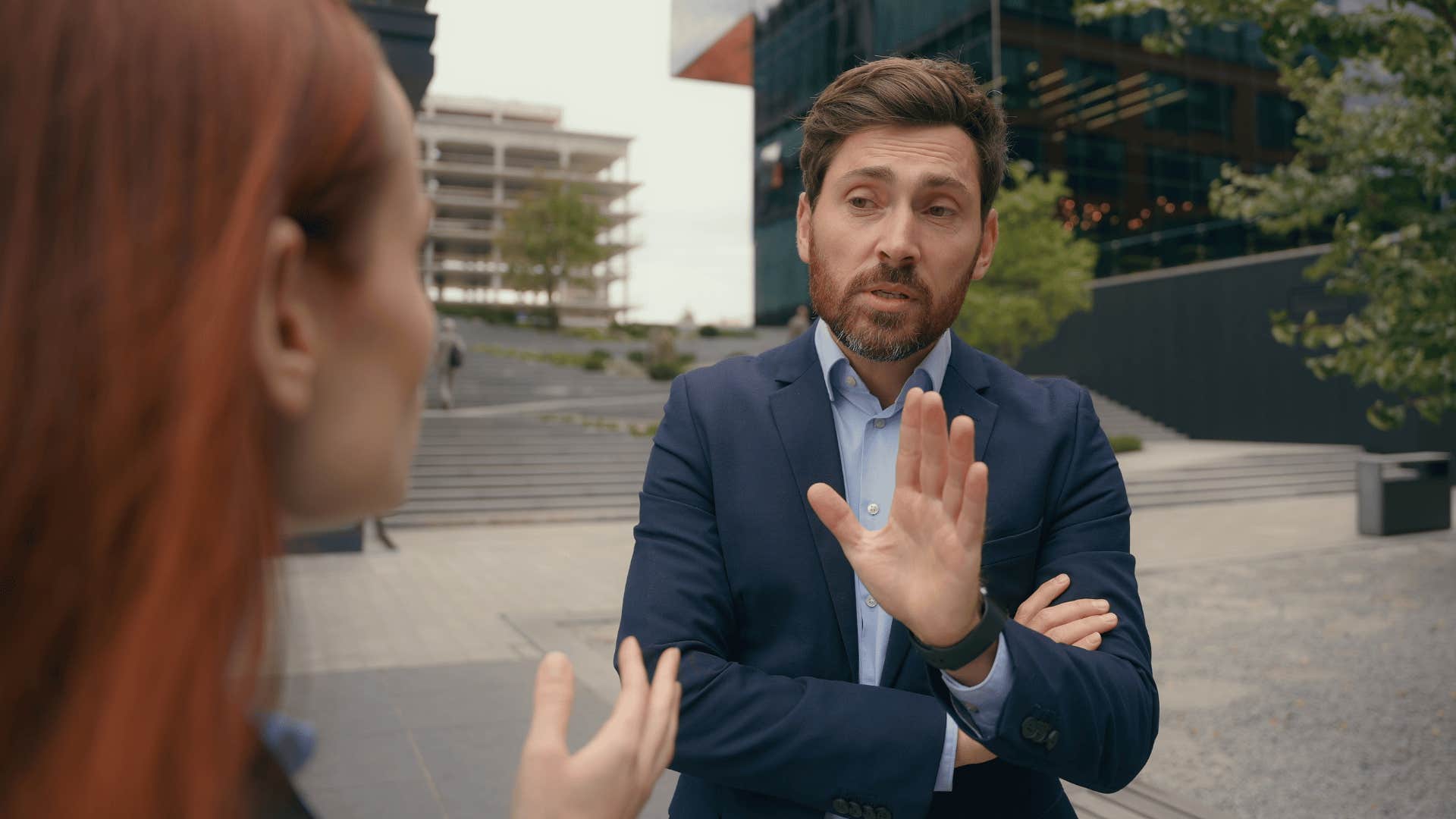11 Phrases People Use When They Have No Self-Awareness
These individuals have a difficult time understanding the way they present themselves to the world.
 fizkes | Shutterstock
fizkes | Shutterstock A person with self-awareness is able to understand themselves on a deeper level, focusing in on their thoughts and emotions, and how others perceive them. Self-awareness is a core component of life skills and abilities. Unfortunately, there are phrases people use when they have no self-awareness, exposing their inability to reflect on their actions.
While most people haven't reached full maturity, those who lack self-awareness tend to blame, deflect, and do everything in their power to avoid taking responsibility for what they do and say. It's not only childish, but shows just how important it is to be self-aware and grow as a person.
Here are the 11 phrases people use when they have no self-awareness
1. 'I'm not being defensive'
 Anatoliy Karlyuk | Shutterstock
Anatoliy Karlyuk | Shutterstock
During an argument, some people react instead of respond and become defensive. Perhaps they are arguing with their romantic partner in which their flaws are mentioned or are falsely accused of making a mistake. Either way, they become defensive to protect their ego.
But the key difference between people who are self-aware and those who are not often boils down to whether they're able to admit to their behavior. And doing so has been shown to include very specific benefits.
According to research from the International Journal of Behavioral Medicine, higher emotional self-awareness is linked to a person's overall health. A more recent study from the American Journal of Orthopsychiatry found that self-awareness helps prevent stress, trauma, depression, and even anxiety. So, not only is self-awareness beneficial for a person's mental health, but their physical health as well.
To be less defensive during an intense conversation, John Kim LMFT explained that it's important to pay attention to physical reactions. If someone is feeling tense or as if their heart is beating out of their chest, this points to defensiveness. Next, that person should take a calming deep breath and then reflect on why they're feeling defensive. Is it a trigger or do they feel invalidated? Kim also suggests going to therapy to correct these defensive behaviors.
2. 'Trust me, I know myself better than anybody else does'
 insta_photos | Shutterstock
insta_photos | Shutterstock
While it may be true that someone knows themselves better than anyone, everyone has biases that cause them to not view themselves in the most accurate light. So, one phrase people use when they have no self-awareness is "Trust me, I know myself better than anybody else does."
According to organizational psychologist Tasha Eurich, although 95% of people believe they are self-aware, only an estimated 10-15% of people are actually self-aware. Because of this, it's unsurprising that many people know very little about who they are.
How can people know themselves on a deeper level? Well-being expert Tchiki Davis, PhD suggests that if people want to know more about themselves, ask important questions. For instance, making a list of their values, goals, needs, desires or beliefs will help people understand themselves.
That said, there are certain things that they'll never know about their true nature. After all, it's hard to know all their flaws or what they need to work on and, as a result, it's best to ask close friends, family, or a therapist for advice on how to improve.
3. 'I'm perfect just the way I am'
 Ground Picture | Shutterstock
Ground Picture | Shutterstock
Everybody is born with a purpose in this world and has inherent value. But that doesn't mean people don't come with flaws of their own; after all, no one person is perfect. When someone has no self-awareness, they may use this phrase as a way to protect themselves.
Of course, they can think their sense of humor, body, or how they treat others is perfect; however, that doesn't change the fact that, as human beings, we must constantly grow and develop in our day-to-day lives. And according to a study published in New Ideas in Psychology, growth leads to overall well-being in multiple areas of life.
Even so, growing as a person isn't easy and often requires behavioral changes. Luckily, there are ways that people can make these changes and remain committed to the process. A study from Frontiers in Psychology determined the key reasons why people break habits before they're fully formed.
Participants who tracked their behavior on an app daily were increasingly likely to remain committed to behavioral change. It showcases the importance of making strides everyday to improve oneself, and staying consistent in the process.
4. 'It's not my fault'
 MAYA LAB | Shutterstock
MAYA LAB | Shutterstock
People who don't want to reflect on their actions will find ways to deflect. These individuals swear up and down that they're not to blame for whatever went wrong in a situation. Unfortunately, this type of immature behavior leads to dangerous consequences.
It can stunt people's growth or cause their relationships to deteriorate. Meanwhile, taking accountability will only benefit people in the end, and it's a lesson that people with no self-awareness have a difficult time learning.
Board-certified counselor Jennifer Hamady suggested that people should change the way they view taking accountability, adding that the word is often confused with blame:
"Responsibility, on the other hand... is something vastly more powerful, as well as empowering. As the language suggests, it is a 'response ability': the ability to choose our response in every moment to all that is going on around us. A [choice] that allows us to claim ownership of the circumstances of our lives, and thereby, to contribute to making them better."
5. 'It doesn't matter what other people think of me'
 Krakenimages.com | Shutterstock
Krakenimages.com | Shutterstock
When someone has no self-awareness, they may express that they don't care what others think of them. And while there's no use getting worked up over people who want to bring you down, there are some instances where people should absolutely care what others think.
Whether it's going on a first date or going on a job interview, first impressions matter. And as a study from the European Journal of Social Psychology points out, it can be difficult to reverse a bad first impression. Like it or not, these impressions can either close doors or open them.
Even in relationships, not caring about a partner's feelings can create resentment. So, the next time someone utters this phrase, they should remember that actions have consequences, which can either create opportunities for them or leave them stuck where they are.
6. 'I'm just being honest'
 fizkes | Shutterstock
fizkes | Shutterstock
There's nothing wrong with a little bit of honesty, but when someone with no self-awareness says this phrase, they are doing so to escape the consequences of their words. There's a difference between being honest and being cruel, and people who lack self-awareness don't know how to balance the two.
Many people will use the excuse of "just being honest" to be cruel to those who annoy them or make them angry. But what they think is true is, at its core, their own biases.
According to psychotherapist Avrum Weiss, Ph.D., people like this are "not telling the truth because it's not possible to speak about someone else's truth, only your own. What they are doing is simply speaking aloud some of the critical judgments they hold about the person they are speaking to. The only real truth we can tell is the truth about our own experience."
This "just being honest" phrasing begins to feel manipulative as they actively try to convince those around them that there's nothing wrong with their actions. Instead, they can say something like, "This is my truth," so they aren't unintentionally speaking for others.
7. 'I don't need anybody's help'
 insta_photos | Shutterstock
insta_photos | Shutterstock
It's a good thing to be independent in life, but there is such a thing as being too independent, as there's nothing wrong with needing to lean on someone when times get tough. Maybe it's a rent increase, struggling to pay for groceries, or depending on a neighbor for a favor.
At some point in life, there will be a need for others to depend on one another for support. Unfortunately, people with no self-awareness don't quite understand this concept and use the phrase "I don't need anybody's help."
According to a study from the Korean Journal of Family Medicine, having a support system is crucial for people's well-being, as having a good social support system leads to an increase in happiness. But many people don't have a great support system and, as a result of trauma, they find it increasingly hard to open up and trust others.
Fortunately, activities like journaling and therapy are options people can consider to help them slowly heal. Additionally, building a support system is a great option, whether it's through social networking, attending school or church, or volunteering.
8. 'People always misunderstand me'
 Antonio Guillem | Shutterstock
Antonio Guillem | Shutterstock
"People always misunderstand me" is one of the phrases people use when they have no self-awareness. While people won't necessarily understand others completely, especially if they are a mere acquaintance, it's important for individuals to be open to new ideas and perspectives.
As it turns out, people can likely understand others better than they understand themselves, and it all has to do with people's biological need to connect. According to UCLA professor Matthew Lieberman in his book "Social: Why Our Brains Are Wired to Connect," people's need to connect is just as great as their need for water, food, and shelter. So, other people won't misunderstand or shut someone out just for the fun of it; rather, if they truly care for someone, they'll find ways to connect and meet them halfway.
The next time someone utters this phrase, remember that people aren't purposely trying to misunderstand others, they are simply using their emotions and opinions to form their own conclusions.
9. 'I'm different from other people'
 piksekstock | Shutterstock
piksekstock | Shutterstock
Everyone is different from others', whether it's their personality, interests, lifestyle, or genetic diversity. We are all unique in some way; however, there are biological behaviors and reactions that make us more similar than different. According to a study published in the journal Science, human behavior is 93% predictable.
In a sense, people aren't so different from each other. Our predictable behavior and reactions tend to align, and people who say they are much different from others are either unaware or purposely denying who they are and what they're capable of.
To become more self-aware, people should acknowledge that they aren't immune to human nature. They are flawed and reactive, just like everybody else around them. Once they're able to acknowledge this, only then can they become self-aware of their actions and how their behavior affects others.
10. 'They are just jealous of me'
 fizkes | Shutterstock
fizkes | Shutterstock
When someone who lacks self-awareness says others are just jealous of them, it's not necessarily true. Jealousy is an emotion everyone feels at some point, whether it's aimed at a friend, a co-worker, or even a stranger. Jealousy is simply part of the human experience, as professor of philosophy Berit Brogaard says, one that is "an inherited response that once increased our chances of survival."
Among women, it's common to hear them say that other women "hate them" because of their looks. But according to research from the Journal of Personality and Social Psychology, individuals who are perceived as more attractive are more likely to have positive traits associated with them such as kindness, intelligence, and success.
So, most people won't simply hate someone or be jealous of them because of their good looks. Instead, they don't think the best of others simply because they haven't yet shown that they're an upstanding person.
11. 'I'll be fine'
 Krakenimages.com | Shutterstock
Krakenimages.com | Shutterstock
When people fake their happiness, it's usually for the sake of not making others uncomfortable. They'll smile big and reassure others that they're okay. Similarly, people with no self-awareness use the phrase "I'll be fine" to protect their ego, despite how much it shows that they're out of touch with those around them.
But by not expressing their emotions and effectively suppressing them, they are burdening themselves. A study in the International Journal of Psychotherapy Practice and Research found that people who suppress their emotions may experience a suppression of their body's immunity, making them increasingly likely to get sick.
People who aren't self-aware should do their best to open up and be vulnerable, especially with the people who care about them. Even if it's only through text messages, expressing those feelings is a step in the right direction.
Marielisa Reyes is a writer with a bachelor's degree in psychology who covers self-help, relationships, career, family, and astrology topics.

